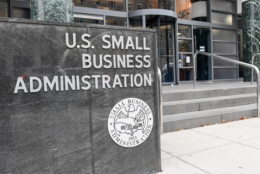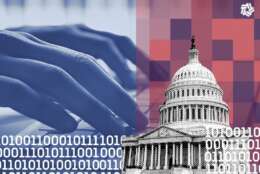Management
-
For a period of some 35 years, a million people were potentially exposed to contaminated drinking water at Camp Lejeune, the Marines base camp in North Carolina. Since 2017, veterans from that era are presumed to have service-related illnesses from drinking that water.
September 16, 2022 -
In today's Federal Newscast: A BRIGHT idea by lawmakers could save millions of taxpayer dollars. The Biden administration takes steps to loosen COVID-19 restrictions. And the IRS moves toward establishing the Federal Contractor Tax Check System.
September 16, 2022 -
The pandemic has depressed blood and plasma donations to what the Health and Human Services Department is calling historic lows.
September 15, 2022 -
After implementing public feedback, the Office of Management and Budget published its final version of the governmentwide learning agenda.
September 15, 2022 -
Clifford Lane is the clinical director for the National Institute of Allergy and Infectious Diseases and a Service to America Medal finalist
September 15, 2022 -
The Homeland Security Department's headquarters project might be one of the longest running construction programs in government history. Planning started more than 17 years ago. And the latest estimates pegged the completion date now at 2027.
September 14, 2022 -
The Hatch Act prohibits political activities by federal employees on the job. It only applies though to executive branch agencies. When the head of the administrative office of the U.S. courts enacted new rules for that agency's employees that went even further than the Hatch Act, not everyone was on board. Two employees filed a lawsuit.
September 14, 2022 -
The State Department will add a new internship program to its roster. The Colin Powell leadership program will open to college students and recent graduates and it's planners hope, prepare them for long term success at the State Department.
September 14, 2022 -
On this episode, we talk with IRS executive Ken Corbin, long-time government and industry CX leader Martha Dorris and industry executive Angy Peterson about the power and promise of on-going customer experience efforts in the federal market and ACT-IAC’s upcoming CX Summit.
September 14, 2022 -
In today's Federal Newscast: Most GSA childcare facilities did not test their drinking water, which was likely contaminated, after returning from the COVID shutdown. Bipartisan lawmakers are looking to limit the ability of some feds to trade individual stocks. And the Biden administration fills two brand-new positions to government.
September 13, 2022 -
A review by the SBA Office of Inspector General found a number of applications for Economic Injury Disaster Loans from foreign IP addresses were flagged as fraudulent, but not properly reviewed.
September 12, 2022 -
VA was the only large agency to increase its employee satisfaction score in 2021, but VA senior leader Gina Grosso said workforce improvements don’t end there.
September 12, 2022 -
The program established by the National Academy of Public Administration just marked its first year of operation, the Center for intergovernmental Partnerships has already contributed to NAPA's work on the grand challenges in public administration.
September 12, 2022 -
The Interior Department has a new chief information officer in Darren Ash, who inherits a $1.6 billion IT budget and comes over from the Agriculture Department.
September 12, 2022 -
Last year, Congress asked the National Academy of Public Administration to examine the sources of data for Social Security and how well it can access them. Here is what they found.
September 09, 2022















